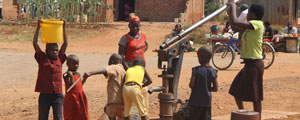
BEITBRIDGE — Hundreds of villagers in Gukunze Village in the Tongwe area in Beitbridge have started benefiting from the rehabilitation of several boreholes which broke down years ago, leaving them with no source of clean water.
BY PHILLIP CHIDAVAENZI
Village head Pasani Nyoni said the rehabilitation of the boreholes in his area, which serviced a total of 149 households in Pasani, Kone and Mgwalisani villages, had given locals hope after several years of scrounging for the precious liquid.
“People used to walk long distances to find water after the borehole in this village broke down in 2009,” he said. “We are, however, happy now that the borehole has been rehabilitated.”
The rehabilitation of the boreholes is being done with financial support from the United Nations Children’s Fund (Unicef) as part of its rural Water and Sanitation (WASH) programme.
Villagers who spoke to NewsDay said the rehabilitation of the boreholes had given them a new lease of life as they now had access to the precious liquid and were now able to do their gardening to boost food security.
“We have been able to develop small gardens where we are largely producing vegetables and tomatoes for household consumption,” said Enita Mudau.
Another villager, Victor Moyo, said although there were several boreholes in the village, only one was now functioning after it was rehabilitated.
- Chamisa under fire over US$120K donation
- Mavhunga puts DeMbare into Chibuku quarterfinals
- Pension funds bet on Cabora Bassa oilfields
- Councils defy govt fire tender directive
Keep Reading
“All the other boreholes in the areas are still broken down,” he said.
Several villagers have constructed Blair toilets to curb open defecation as part of the rural WASH programme. Although 73% of the population has access to safe water and 60% to improved sanitation facilities, more than 60% of the rural water supply infrastructure is in disrepair and 40% of Zimbabweans in rural areas practice open defecation, according to statistics from Unicef.
Under WASH, Unicef manages a $30 million programme to improve access to safe water and sanitation for 500 000 inhabitants in 14 small towns in Zimbabwe, among other things.











